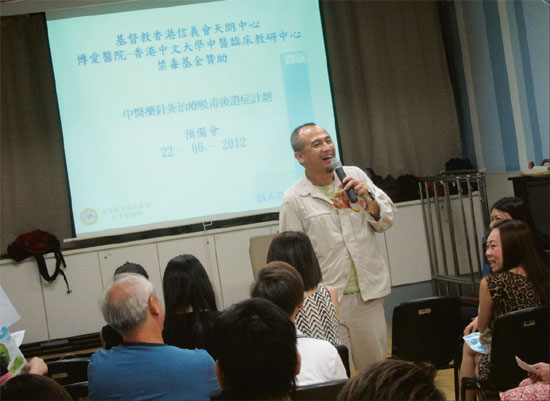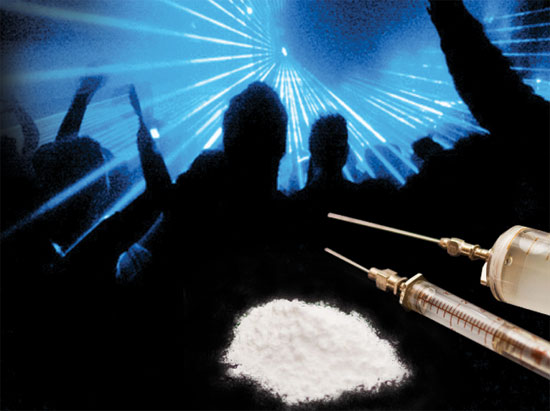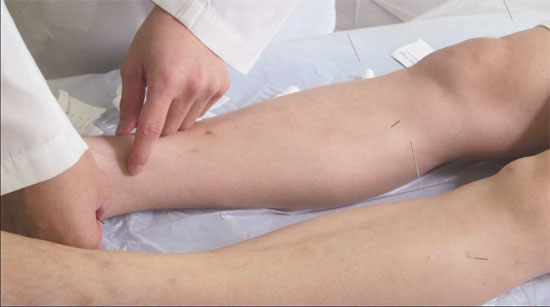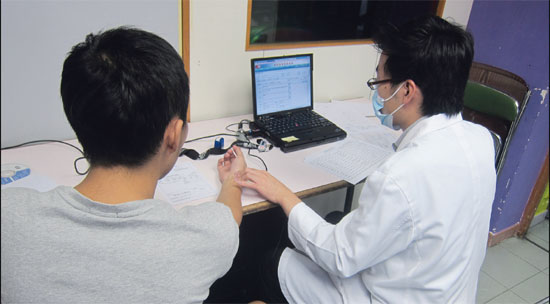Searchers in shadowy places
Updated: 2012-10-17 06:30
By Ming Yeung(HK Edition)
|
|||||||
|
Lau Wang-cheung, center-in-charge of Enlighten Centre of Evangelical Lutheran Church Social Service, said it is important to let the young people find a goal, small or big, in life to substitute their loneliness after they quit taking drugs. Provided to China Daily |

|
Acupuncture treatment has been proven effective to cure frequent urination of ketamine users. Provided to China Daily |
Officials can only give estimates of the number of drug abusers in Hong Kong. Many remain unseen, hidden away in private homes, or dark alleys. They're hard to find. They need help. Ming Yeung reports.
Before attending his scheduled acupuncture treatment, Sky sits quietly in a room with a social worker, sharing with China Daily, his first-hand account of his past, and his gnawing addiction. The genteel young man - except a colorful tattoo appearing indistinctly under the black shirt on his left arm - offers no explicit clue to outsiders how tranquilizers had previously taken a toll on him.
Obviously uneasy about talking to a stranger, Sky often seems lost in deep thoughts. He shifts his gaze and seems to be looking far away, as if the right words may be somewhere out there. He speaks in a low, gentle voice, giving only short answers. It's clear that it's painful for Sky to recall the days when he was a slave to drugs, ketamine mostly, the result of which is that he lives with a badly damaged bladder.
In 2000, ketamine, which is commonly used as an animal tranquilizer by veterinarians, became regulated under the Dangerous Drugs Ordinance.
Usually "snorted" as a powder, ketamine can cause perceptual changes or hallucinations as well as giving the user a floating feeling, as if mind and body are separated.
Frequent ketamine use is associated with impairments in long-term memory, cognitive difficulties, and deficiency of motor coordination. It also leads to renal failure, reduced bladder volume, incontinence, and discomfort in passing urine.
"During the worst days, I had to pee every 15 minutes," said the 26-year-old, who started abusing substances at the age of 13.
Growing up in Yuen Long, where the young gangster problem is more serious than in almost any other part of Hong Kong, Sky joined a triad group and served as an underling to a "big brother."
Sky tried crack cocaine first. He switched to ketamine, thanks to its widespread availability and low cost. He was still going to school back then. In his free time, he "worked" for the big brother "using whatever means he could find" to fund his addiction. He was unwilling to provide details of how he managed.
Lau Wang-cheung, center-in-charge of the Enlighten Centre of the Evangelical Lutheran Church Social Service (ELCHK), revealed that Sky's big brother - also a longtime addict - plunged from a height to his death about two weeks ago, apparently losing consciousness, after taking an overdose. Like most heavy drug addicts, Sky assumed he could control the amount of ketamine he took. He was wrong. It wasn't long before he felt he could not live without the drug to dull his pain.
"Several times, I tried to stop using ketamine," said Sky. He relapsed immediately, every time he started hanging out with his old buddies again. "One time, a friend of mine asked me out for drinks, I took it (ketamine) again."
He left school after Form Four and hid at home for almost a year. "I didn't have to attend school, nor did I want to work, so I just played games at home."
At first, Sky blamed the bad acquaintances he grew up with for luring him into taking drugs. But bit by bit, he revealed that it was his quarreling family that he wanted to escape.
"Probably it was because of my dad who always got drunk and fought at home, which made me not want to stay at home," he recalled. Drugs that made him feel euphoric, he said, were an escape.
"Whenever he was home, I would be out with my friends until late nights," he continued. "When I look back, I know my parents loved me but they just didn't know how to show it."
During the time when Sky hung out with friends in the early 2000s, youngsters could be seen in playgrounds or night clubs taking drugs together, Lau acknowledged. But the public was abruptly awakened to the drug problem in 2008, when some students were found abusing drugs in public areas and even schools.
What is especially worrisome to law enforcement officials and social workers, is the fact that many of drug's newest addicts are in their early teens, or younger.
In a survey carried out in 2008-2009, the youngest first-time drug user was just 8. The shocking trend triggered tightening of the government's tactics to combat drug abuse.
After several big-scale crack downs on vice establishments and drug syndicates by the police, the youths either went across the border to Shenzhen or stayed hidden at home to get high.
"If you look at the 'surface', you don't actually see them," Lau noted. "When there's a demand, there is a supply. Online drug dealings are a continuation of a series of anti-drug operations."
In newly-developed towns like Tin Shui Wai, "couriers of drugs" are particularly active in highly concentrated housing estates. They are more difficult to track in places where a phone call is more than enough to get the drugs you want, simply like ordering food delivery.
Instead of a new wave of young drug abusers, Lau is more concerned about the drug addicts who have abused drugs for more than a decade, as he described them "a ticking bomb, in the local community".
"I'm not saying they distribute drugs to other people, but they may develop hallucinations and lose control of themselves and end up hurting others," Lau said.
Stanley Ho Chun-yu, project officer of Nitecat Online, a pilot cyber youth outreach project at the Boys' and Girls' Clubs Association of Hong Kong, has spent a few years trying to contact troubled, hidden youths online and provide them with assistance for problems they encounter, including drug problems.
Half a decade ago, the association observed that drug dealers tried to contact the youths through platforms such as online games and forums, enticing them to have fun in Shenzhen, provided with free drugs.
The police admitted that "the main issue with online investigations is anonymity offered by the internet, which often delays the identification of culprits."
Due to the hidden nature of the cyber world, Ho admitted that none of the drug users would voluntarily reveal his secrets to social workers but the workers could approach them when they asked drug-related questions on the Internet. "Start off with other issues, the young people may gradually tell us they also have drug problems, when we have built trust with each other."
The new platform lowers the guard of the vacillating students, who may turn to drugs when troubled, Ho pointed out.
Ho complained, the government has spent a large sum of money "to sweep the dirt under the carpet". Drug dealing has gone underground but not disappeared, he said. "Schools are trying to get rid of drug-taking students, not helping them."
The government has long followed "a five-pronged strategy" to tackle the problem, focusing on "prevention education and publicity".
"It is by instilling a drug-resistant attitude among the public that we could avoid more people falling prey to the adverse impacts of drugs," said a spokesman of the Narcotics Division (ND), Security Bureau.
"On the preventive education and publicity front, the focus is on reducing the demand for illicit drugs by imparting knowledge on drugs to different stakeholders, dispelling any misconceptions, strengthening young people's life skills and resistance to adversity and temptations, and mobilising the whole community to join the anti-drug cause.
"With deterioration in the situation in youth drug abuse in the past decade, it becomes necessary and important to focus on preventive education work at schools, as an important platform through which to target young people, helping them to understand the evils of drugs and build a drug-resistant attitude," the spokesman added.
The government regarded the pilot Tai Po drug test scheme a successful one as no positive case had been found. Since then, the Healthy School Programme with a Drug Testing Component has been implemented in schools on a voluntary basis.
On June 5, the administration "briefed the Security Panel of the Legislative Council on the plan for launching a public consultation on whether community-based drug testing should be implemented, and if so, how."
"The government adopts an open attitude on the subject and has no preconceived idea, especially in the absence of a community consensus," said the ND spokesman.
The administration wants to stretch farther to cover drug addicts in the community, not just in schools. But Lau Wang-cheung worries that the move will drive more young people away from the streets.
"It is understandable that the schools try to get rid of drug addicts in the campus to protect the 'clean' students," said Lau. "But I would urge the authority not to just focus on drug tests."
Lau advocated an inter-departmental cooperation to address drug problems among young people, because "eradicating the supply chain won't be adequate to combat the widespread drug abuse," because the government does not delve into reasons why the young people choose to take drugs in the first place.
"Some kids just don't do well academically and they have low self-esteem. They lose identities in mainstream society. By retreating to drugs, they feel like they are alive," Lau said. "Somehow they feel that drugs mean something to them."
In order to help them kick the addiction, Lau suggested, it is important to let them find a goal, small or big, in life to substitute their loneliness when they quit taking drugs.
After releasing a big sigh, Lau went on saying, "There are, and will be, a certain number of young people living under the poverty line and lack of opportunities to move upward, so we have to lend them a hand in their most difficult times."
In addition, Stanley Ho said, giving the youths "a second chance" to become self sufficient is vital to encourage them to abandon drugs for good.
"Many of them want to leave the circle, but due to hardships, since they can hardly go back to school and get stable jobs, they prefer to risk danger to make more money," Ho said, adding that being a small drug dealer can earn HK$100,000 a month.
"It's not just about kicking the habit, but a matter of prospects for these young people."
The government is willing to offer a hand to the needy kids, the ND spokesman said. "We encourage rehabilitated youths (such as those who have completed the voluntary treatment programmes) to return to schools. The Regional Education Offices and Non-attendance Cases Team of Education Bureau provide placement services to ensure that rehabilitated students aged 15 or below attend schools and to assist those above 15, if they so wish, in seeking suitable school places."
Sky's parents eventually found out about his covert habit several years ago. "They noticed my enervated appearance and my frequency of using the toilet."
Sky encountered similar response as other families who face similar situations: father lambasting, mother crying, and sister helping to look for social workers.
Sky then accepted acupuncture treatment provided by ELCHK. The centre offers rehab services for long-term drug users, 80 percent of the drug abusers use ketamine, not to help them kick the addiction, but to ease their pain for quitting and enhance their bodies, to prepare them for treatment through Chinese medicine and acupuncture.
"We have seen impressive results using acupuncture treatment to cure frequent urination," said Wong Ka-yee, a registered Chinese Medicine Practitioner at Pok Oi Hospital. The three-month, 31-session treatment helps normalize the patients' bladder function, she added. For instance, a five-minute frequency of washroom visits can be improved to five to six hours.
"Many of the patients know deep down they need to get rid of ketamine once and for all, but they can't endure the pain of going to toilet, so they continue to take it which creates a vicious circle," Wong remarked.
Luckily, Sky works with his father at a car repair shop which enables him to support himself.
Sky still goes out with his childhood friends on sporadic occasions. When asked whether his friends still hook on drugs, he played coy, but vowed to stay clean in the future. "For myself, for my family and for my girlfriend, I won't do it again."
"I feel like I have wasted a lot of time..." Sky paused for a few seconds then continued, "I knew this was bad but didn't know why I had to do it. It was meaningless.
"Never ever take the first snort," Sky warms the youths of today, with a sincere, bashful smile.
|
ELCHK offers rehab services for long-term drug users, 80 percent of them use ketamine, to ease their pain for quitting, by Chinese medicine and acupuncture treatment. Provided to China Daily |
(HK Edition 10/17/2012 page4)


